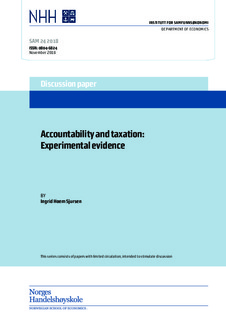| dc.contributor.author | Sjursen, Ingrid Hoem | |
| dc.date.accessioned | 2018-11-19T14:38:11Z | |
| dc.date.available | 2018-11-19T14:38:11Z | |
| dc.date.issued | 2018-11 | |
| dc.identifier.issn | 0804-6824 | |
| dc.identifier.uri | http://hdl.handle.net/11250/2573600 | |
| dc.description.abstract | The Rentier State Hypothesis states that taxation promotes government accountability. The argument is that citizens demand more accountability for spending of tax revenue than for spending of windfall revenue (e.g., natural resource revenue). This paper presents evidence from a between-subject experiment that tests the effect of taxation on demand for accountability and the underlying mechanisms explaining this effect. The design focuses on two main features that distinguish tax from windfall revenue: Tax revenue is produced by citizens' work and has been in their possession before being collected as tax. These features are theorized to increase the salience of fairness considerations in public service provision, and this increased salience of fairness is in turn hypothesized to increase demand for accountability. The main finding is that taxation causes a higher demand for accountability when both features of taxation are present. This result is evidence in support of the Rentier State Hypothesis. | nb_NO |
| dc.language.iso | eng | nb_NO |
| dc.publisher | Institutt for samfunnsøkonomi, NHH | nb_NO |
| dc.relation.ispartofseries | DP SAM;24/2018 | |
| dc.subject | Taxation, experiment, fairness, behavioral economics, accountability | nb_NO |
| dc.title | Accountability and taxation: Experimental evidence | nb_NO |
| dc.type | Working paper | nb_NO |
| dc.subject.nsi | VDP::Samfunnsvitenskap: 200 | nb_NO |
| dc.source.pagenumber | 81 | nb_NO |
